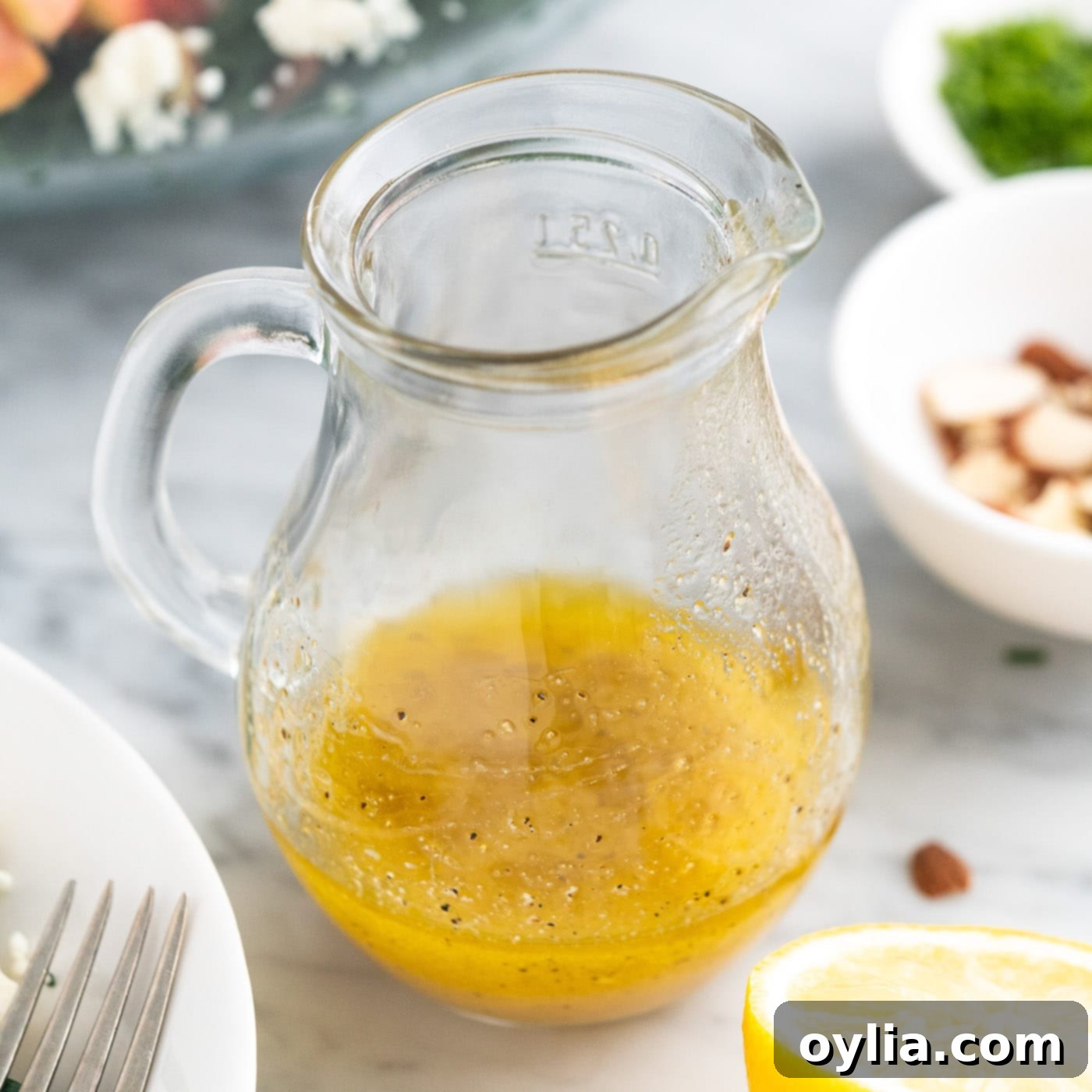Easy Homemade Lemon Salad Dressing: A Zesty Vinaigrette for Every Salad
Elevate your everyday meals with a homemade touch! This incredibly simple yet powerfully flavored Lemon Salad Dressing is a game-changer for any meal. In just 5 minutes, with a handful of fresh ingredients, you can whisk together a vibrant, refreshing citrus vinaigrette that promises to bring new life to your leafy greens and beyond. Say goodbye to store-bought dressings filled with unpronounceable ingredients and embrace the fresh, zesty goodness of this easy recipe.
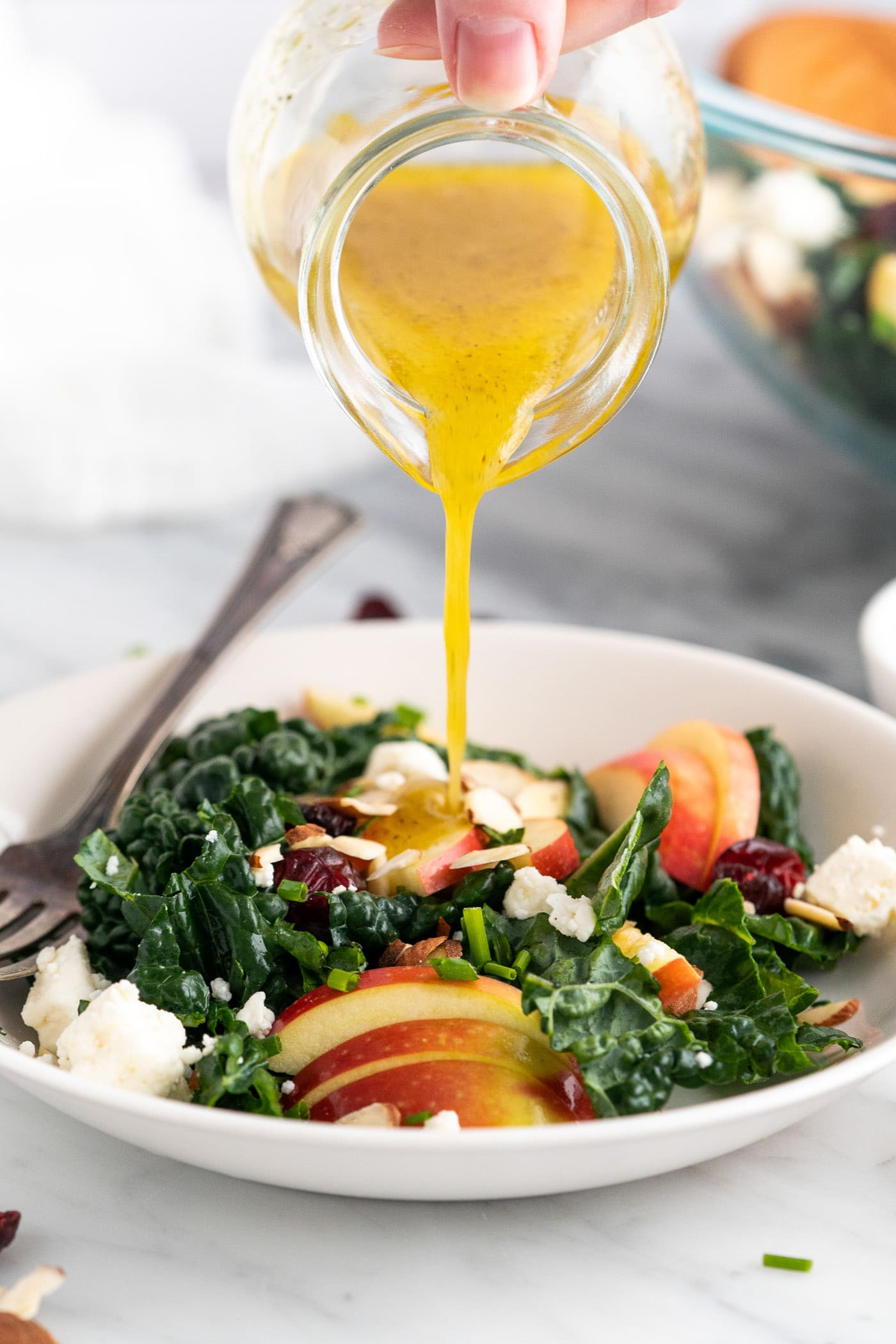
Why This Homemade Lemon Vinaigrette is a Must-Try
This lemon salad dressing isn’t just easy; it’s perfectly balanced and incredibly versatile. Crafted from a base of bright, fresh lemon juice, rich extra virgin olive oil, a touch of sweet honey, tangy Dijon mustard, and seasoned simply with salt and pepper, it’s a symphony of flavors. The acidity of the lemon cuts through richness, the olive oil provides a silky mouthfeel and healthy fats, while the honey and Dijon mustard add depth and help emulsify the dressing, creating a smooth, cohesive texture. Whisk these simple ingredients together in a bowl, and you’ll have a delightful, zippy, and refreshing dressing ready to drizzle over crisp salads year-round.
What truly makes this recipe a winner is its adaptability. We particularly adore this lemon vinaigrette tossed into our kale salad, where its vibrant notes beautifully complement crunchy apples and tangy feta cheese, as seen in the accompanying photos. However, its magic doesn’t stop there. It tastes absolutely divine over any fresh dinner salad, offering a light and invigorating alternative to heavier cream-based dressings. You can even use it to brighten up grain bowls, roasted vegetables, or as a light marinade for chicken or fish. Its simplicity and robust flavor make it a staple for anyone looking to add a fresh, healthy kick to their culinary repertoire.
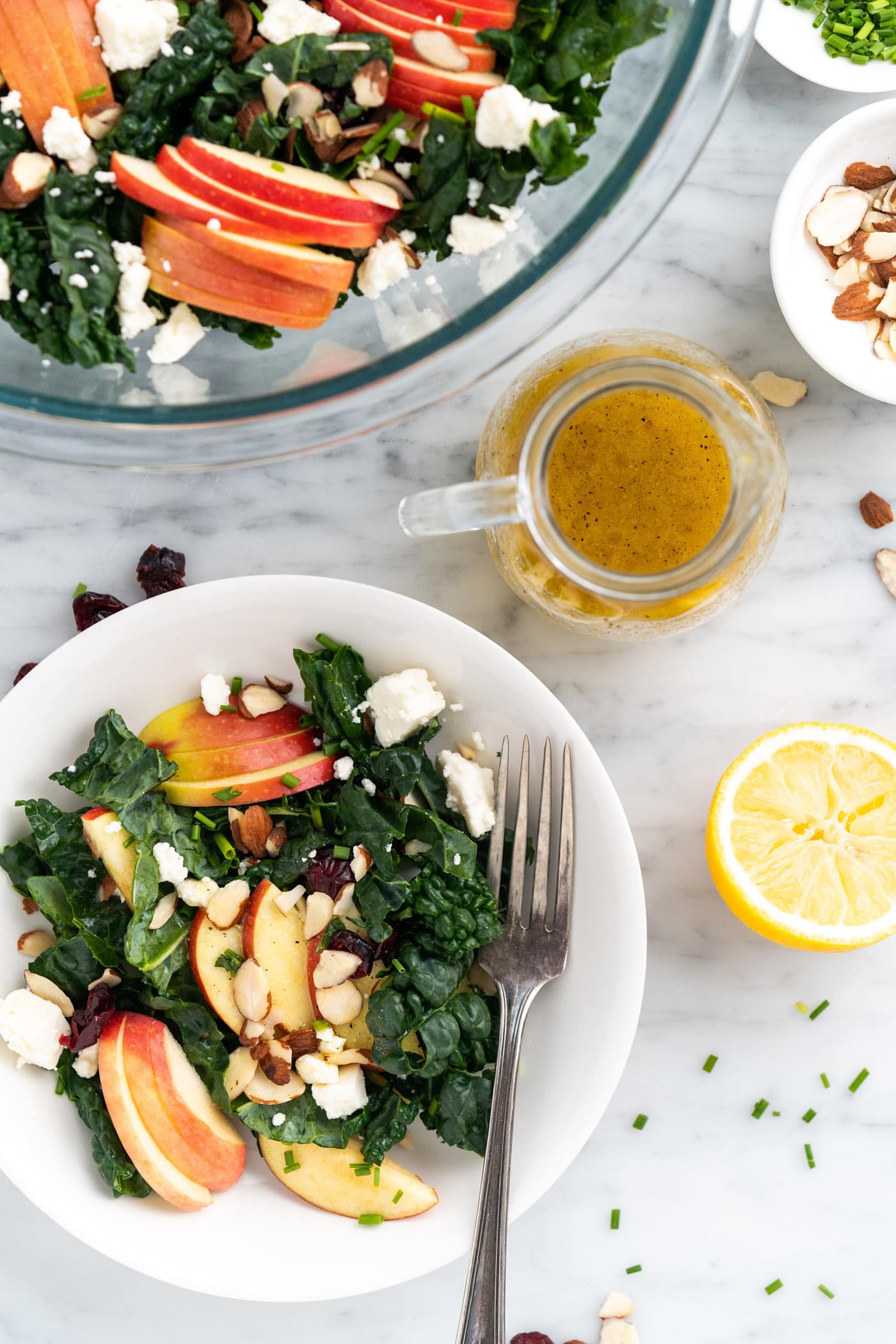
Simple Ingredients for a Superior Lemon Dressing
One of the best aspects of this homemade lemon dressing is its short and sweet ingredient list. You likely already have most of these pantry staples on hand! The magic happens when these few, high-quality ingredients come together to create a flavor explosion. For exact measurements and a printable version of the recipe, scroll to the end of this post where you’ll find our detailed recipe card.
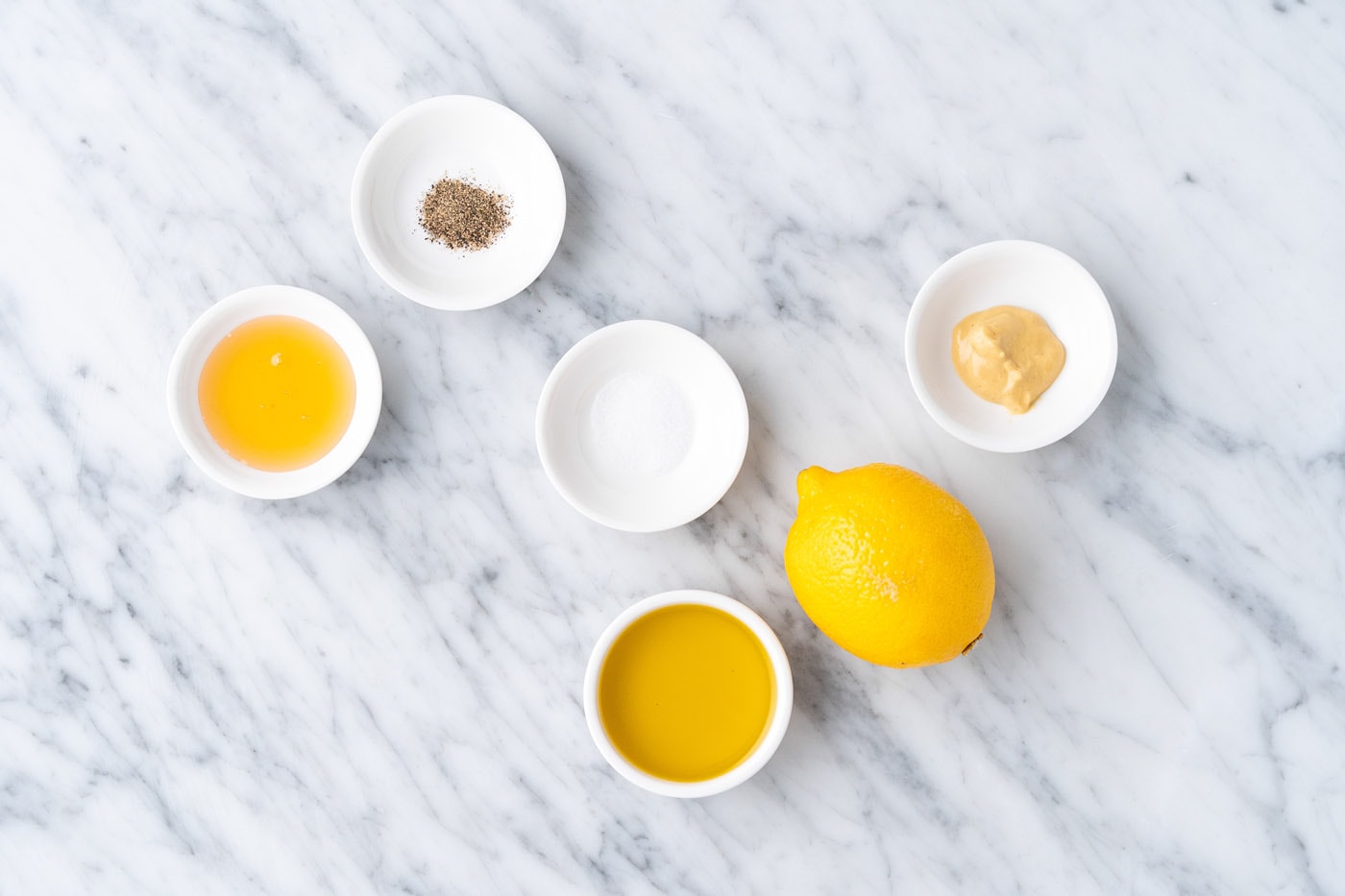
Ingredient Spotlight: Tips & Swaps for Your Lemon Vinaigrette
Let’s dive deeper into each component of this fantastic lemon vinaigrette recipe and explore how to get the most out of them, along with smart substitution ideas.
- Fresh Lemon Juice: This is the star of the show! It’s paramount to use fresh lemon juice rather than the bottled variety. The difference in taste is truly remarkable—fresh lemons provide a brighter, more aromatic, and less artificial tang. One regular-sized lemon typically yields about 2-3 Tablespoons of juice. To get the most juice from your lemon, roll it on a counter with a little pressure before cutting and squeezing. You can also briefly microwave it for 10-20 seconds.
- Extra Virgin Olive Oil: As the base of this vibrant dressing, a good quality extra virgin olive oil is essential. It provides a smooth texture, healthy monounsaturated fats, and a depth of flavor that complements the lemon beautifully. Look for cold-pressed varieties for the best quality. If you don’t have extra virgin, a lighter olive oil or even avocado oil can work, though they might alter the flavor profile slightly.
- Honey: The touch of honey in this dressing plays a crucial role. It mellows out the tartness of the lemon, adding a subtle sweetness that balances the overall flavor. Beyond taste, honey also acts as a natural emulsifier, helping the oil and lemon juice blend together smoothly. If you prefer a vegan option, maple syrup or agave nectar can be used as direct substitutes, offering a similar sweetness.
- Dijon Mustard: Don’t skip the Dijon mustard! It’s not just for flavor; it’s a secret weapon for achieving a perfectly emulsified dressing. Dijon adds a creamy texture and a subtle, sophisticated tang that enhances the lemon and balances the sweetness of the honey. While classic Dijon is best, a stone-ground mustard can be used for a slightly coarser texture and milder flavor. In a pinch, a tiny bit of dry mustard powder can work, but liquid Dijon is preferred for its emulsifying properties.
- Salt and Pepper: These basic seasonings are vital for bringing all the flavors together. Always use good quality salt, like sea salt or kosher salt, and freshly ground black pepper for the best taste. Adjust amounts to your personal preference. A pinch more can often make flavors pop!
- Optional Enhancements: Want to take your lemon dressing to the next level? Consider adding a finely minced garlic clove for an aromatic boost, or a teaspoon of fresh herbs like chopped parsley, dill, or chives for extra freshness. A little lemon zest can also intensify the lemony flavor without adding more liquid.
Crafting Your Homemade Lemon Dressing: Step-by-Step
These step-by-step photos and instructions are here to help you visualize how to make this recipe. You can Jump to Recipe to get the printable version of this recipe, complete with measurements and instructions at the bottom.
- To begin, gather all your ingredients. Make sure your lemon is fresh and ready to be squeezed. In a small bowl or a glass jar with a tight-fitting lid, combine the fresh lemon juice, extra virgin olive oil, honey, Dijon mustard, salt, and black pepper. The type of container matters less than ensuring it allows for thorough mixing.
- Once all ingredients are in, it’s time to combine them. If using a bowl, take a whisk and vigorously whisk the ingredients together until they are well combined and the dressing appears emulsified – meaning the oil and liquid are fully integrated and no longer separated. If using a jar, simply screw on the lid tightly and shake vigorously for about 30-60 seconds until everything is well mixed. This shaking or whisking process is crucial for creating that smooth, cohesive texture that makes a great vinaigrette.
- Once mixed, your homemade lemon dressing is ready to use immediately! If you’re not using it right away, refrigerate it until you’re ready to serve. A quick shake or whisk might be needed again before use, as some separation is natural over time.
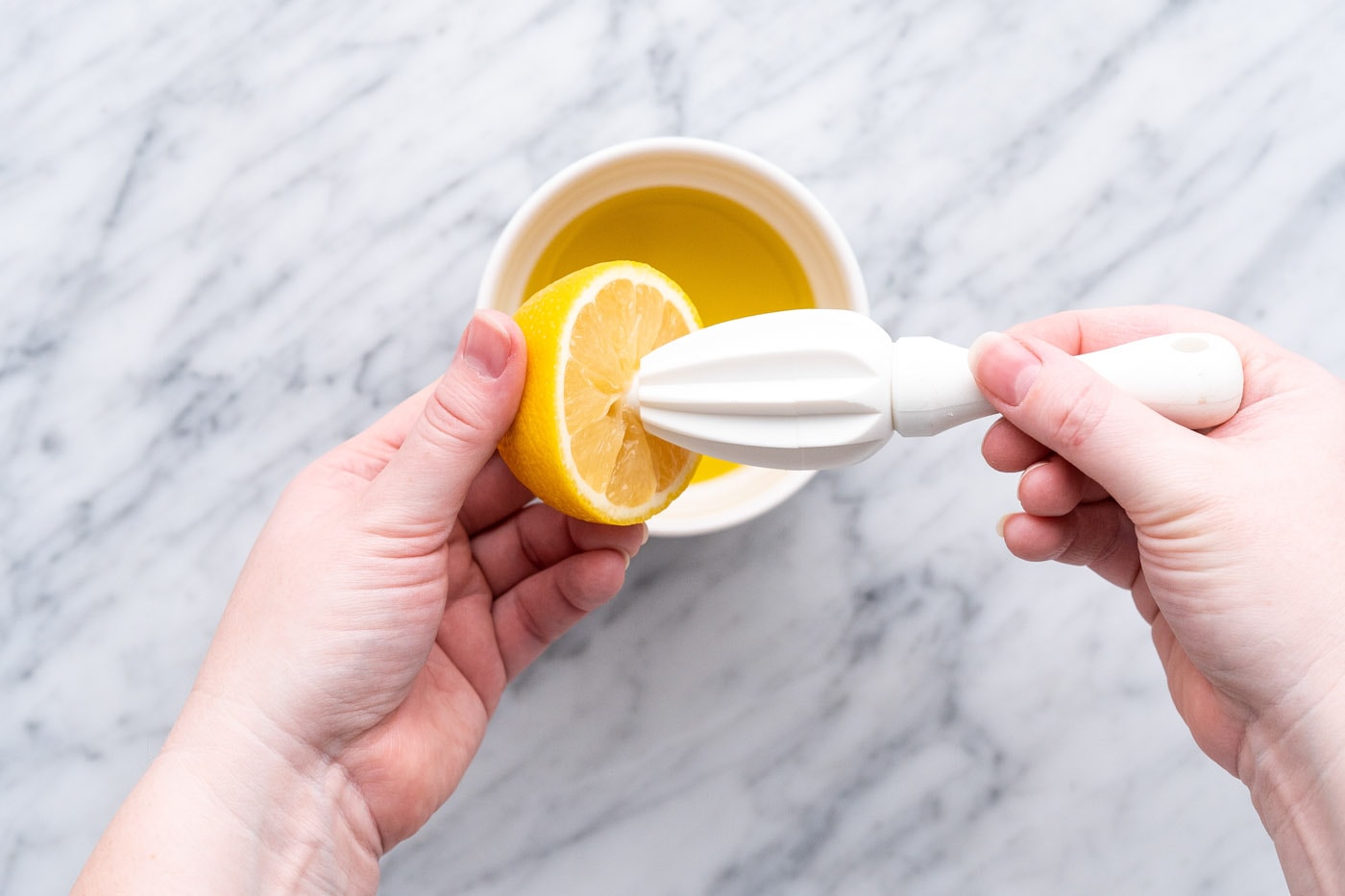
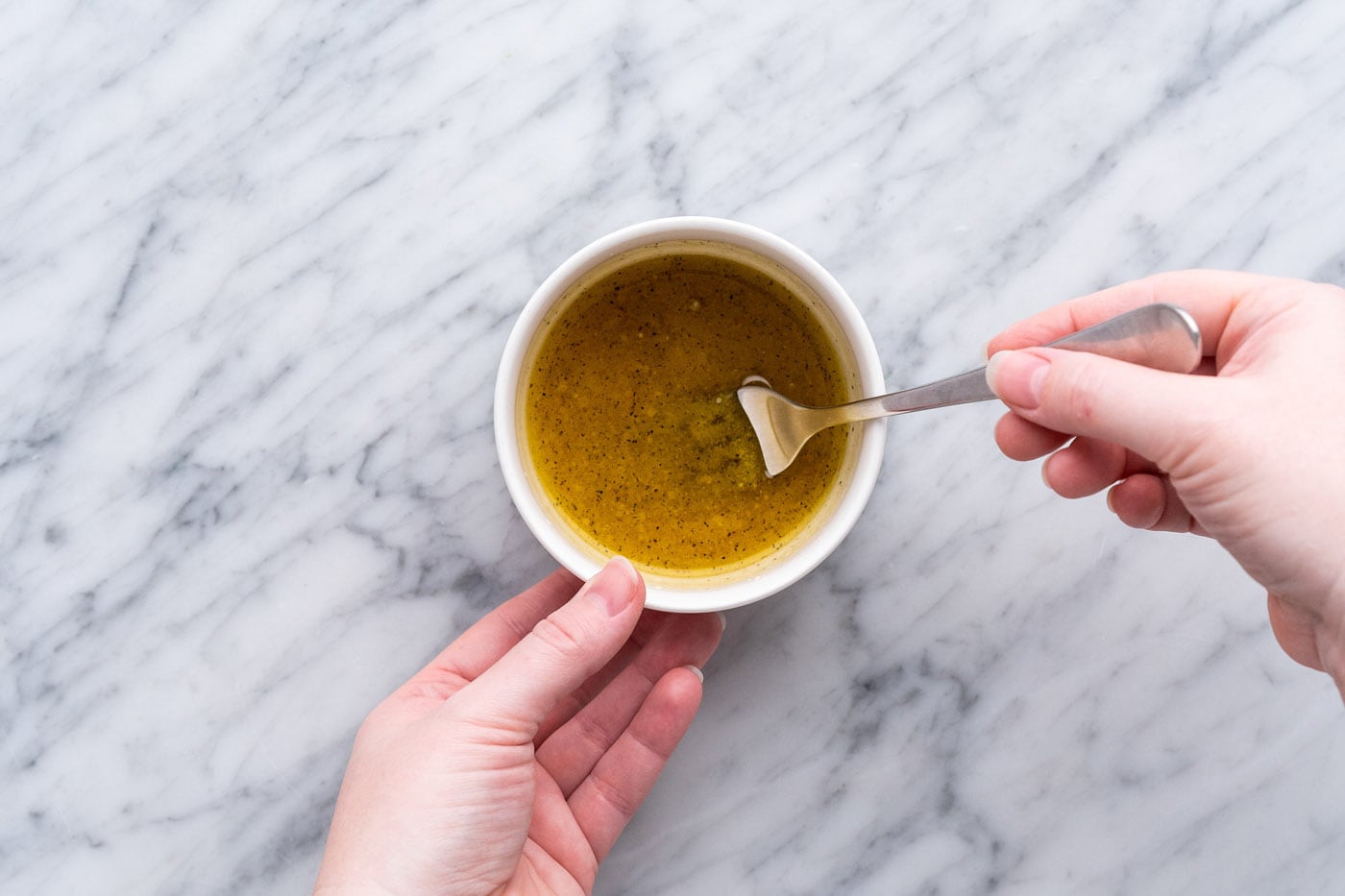
Frequently Asked Questions & Expert Tips for Your Lemon Salad Dressing
This homemade lemon vinaigrette will keep beautifully in a sealed jar or any air-tight container when stored in the refrigerator for up to 1 week. The acidity of the lemon and the properties of the olive oil help preserve it. Always give it a good shake or whisk before each use, as the oil and juice can naturally separate over time.
I wouldn’t suggest freezing this dressing. While technically possible, freezing lemons can cause them to become bitter once thawed. Additionally, the oil and other ingredients might separate and change texture after thawing, resulting in a less desirable consistency and flavor profile. It’s best to enjoy this dressing fresh and within its recommended refrigeration period.
This dressing is already quite healthy, packed with good fats from olive oil and natural sweetness from honey. To make it even lighter, you can reduce the amount of honey slightly or replace it with a sugar-free alternative. Ensure you’re using high-quality extra virgin olive oil for the maximum health benefits.
If your dressing isn’t coming together, it might be due to insufficient whisking or shaking. Dijon mustard is a great emulsifier, but sometimes it needs a little help. Try slowly drizzling in the olive oil while continuously whisking the other ingredients. The slow addition helps the oil integrate into the other liquids more effectively. Ensure all ingredients are at room temperature for better emulsification.
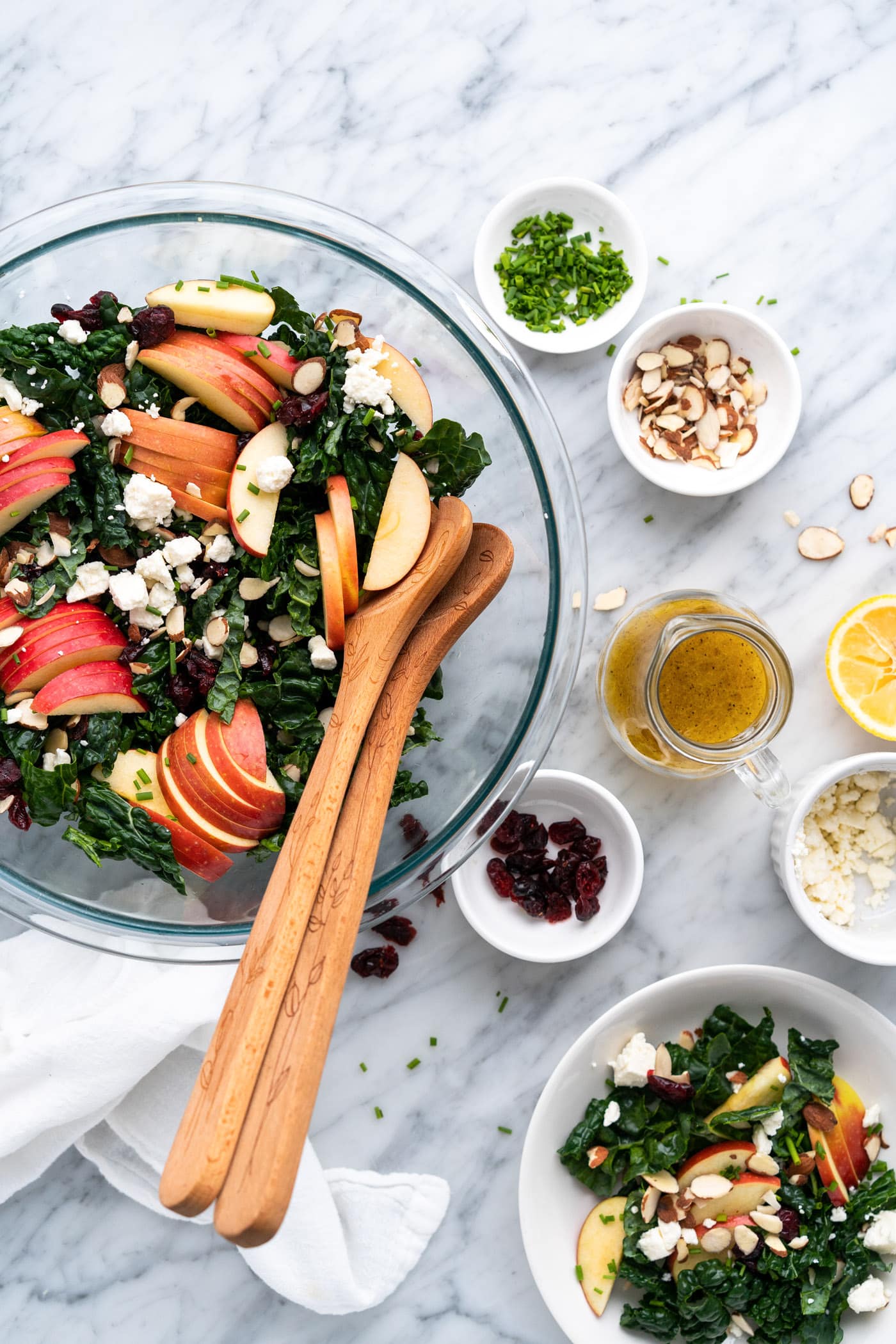
Versatile Serving Ideas for Your Lemon Salad Dressing
This lemon salad dressing is incredibly versatile and can enhance a wide array of dishes. While it’s perfect for traditional green salads, don’t limit its potential!
- Classic Green Salads: Of course, it shines over leafy green salads. Try it with a vibrant mix of spring greens, or specifically with our delicious kale salad, which is bursting with rich flavors and textures. It also pairs wonderfully with a fresh blueberry salad, adding a zesty contrast to sweet berries and crisp romaine lettuce.
- Vegetable Enhancer: Drizzle this bright dressing over sliced cucumbers, ripe tomatoes, or steamed green beans for a simple yet flavorful side dish. It’s also fantastic on roasted vegetables like asparagus, broccoli, or bell peppers, adding a zing that brightens their earthy flavors.
- Grain Bowls & Pasta Salads: Transform a simple grain bowl (quinoa, farro, couscous) with roasted veggies and chickpeas into a gourmet meal with a generous pour of this dressing. It’s also an excellent choice for a light and refreshing pasta salad, particularly one with cherry tomatoes, fresh basil, and mozzarella balls.
- Marinade for Proteins: Use it as a quick marinade for chicken breasts, fish fillets (like salmon or cod), or even shrimp before grilling or baking. The lemon will tenderize and infuse a wonderful citrusy flavor into your proteins.
- Appetizers & Dips: Serve it alongside a platter of fresh crudités as a light dipping sauce, or mix it with some mashed avocado for a quick, zesty guacamole alternative.
The possibilities are endless! Experiment and discover your favorite ways to enjoy this delightful homemade lemon vinaigrette. Enjoy!
Explore More Delicious Homemade Salad Dressings
If you loved this simple lemon dressing, you’re in for a treat! We believe that a great homemade dressing can truly transform a meal. Here are a few more of our favorite salad dressing recipes that are easy to make and packed with flavor:
- Creamy Blue Cheese Dressing: Indulge in a rich, tangy classic.
- Refreshing Creamy Dill Dressing: Perfect for fish, potatoes, or a fresh garden salad.
- Classic Buttermilk Ranch Dressing: A timeless favorite, better than store-bought.
- Sweet & Tangy Blueberry Vinaigrette: A fruity twist for your summer salads.
- Versatile Balsamic Vinaigrette: Another pantry staple for endless meal possibilities.
I love to bake and cook and share my kitchen experience with all of you! Remembering to come back each day can be tough, that’s why I offer a convenient newsletter every time a new recipe posts. Simply subscribe and start receiving your free daily recipes!

Lemon Salad Dressing
IMPORTANT – There are often Frequently Asked Questions within the blog post that you may find helpful. Simply scroll back up to read them!
Print It
Pin It
Rate It
Save ItSaved!
Ingredients
- 2 Tablespoons fresh lemon juice
- 3 Tablespoons extra virgin olive oil
- ½ Tablespoon honey
- 1 teaspoon Dijon mustard
- ¼ teaspoon salt
- ⅛ teaspoon black pepper
Things You’ll Need
-
Whisk
Before You Begin
- It’s best to use fresh lemon juice as opposed to the bottled variety. Trust me, you can taste the difference! One regular-sized lemon will yield 2-3 Tablespoons of juice.
- The honey in this dressing mellows out the bitterness while the Dijon adds plenty of flavor and creaminess. Extra virgin olive oil packs in additional vitamins and antioxidants while creating depth as the base of this recipe.
- This homemade lemon vinaigrette will keep well in a sealed jar or air-tight container kept in the refrigerator for up to 1 week. Give it a good shake before using.
Instructions
-
Add all ingredients to a small bowl or glass jar, and whisk or shake together to combine. Refrigerate until using.
Nutrition
The recipes on this blog are tested with a conventional gas oven and gas stovetop. It’s important to note that some ovens, especially as they age, can cook and bake inconsistently. Using an inexpensive oven thermometer can assure you that your oven is truly heating to the proper temperature. If you use a toaster oven or countertop oven, please keep in mind that they may not distribute heat the same as a conventional full sized oven and you may need to adjust your cooking/baking times. In the case of recipes made with a pressure cooker, air fryer, slow cooker, or other appliance, a link to the appliances we use is listed within each respective recipe. For baking recipes where measurements are given by weight, please note that results may not be the same if cups are used instead, and we can’t guarantee success with that method.
